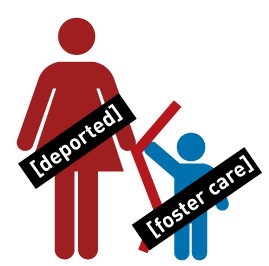RALEIGH, N.C. — When immigration agents deported Felipe Montes to Mexico two years ago, his three young sons were left in the care of their mentally ill, American-born mother in a small North Carolina mountain town. Despite immigration policies that allow for the release of primary caregivers, federal authorities worked swiftly to expel Montes. Within two weeks, social workers placed the boys in foster care.
Child welfare officials are now asking a judge to strip Montes of his parental rights, reasoning it’s better for the children to live with strangers in the country where they were born than with their father in Mexico. Such a ruling could clear the way for their adoption.That would be unfathomable to Montes, whose only brushes with the law were a string of traffic violations.
“I don’t drink, I don’t smoke, I don’t use drugs,” said Montes, 32, who crossed the border illegally in 2003. “I have always taken care of my children, I have always loved them. And now, the social services people want to take away my rights and give my children away to strangers.”
Montes’ lawyer says the father is at risk of being deemed an unfit parent solely because of his immigration status. Like thousands of deported parents whose children were taken in by the foster care system, Montes is barred from returning to visit his kids or attend court hearings on their future. He wants his boys to live with him in El Encino, a small village in the Mexican state of Tamaulipas, but county officials have declined to allow it.
“I can’t see them. I can’t give them a hug. It’s very depressing,” Montes said by phone from Mexico.
U.S. Immigration and Customs Enforcement (ICE) officials say their intent is not to break up families, but there’s no system to allow detained parents to make decisions about their children or reunite with them. Legal experts say parents often lose custody solely due to immigration problems — and not abuse or neglect.
A 2011 report from the Applied Research Center, a New York-based racial justice think tank, found about 5,100 children in 22 states were in foster care after their parents were either detained or deported.
The report — based on surveys with child welfare caseworkers, attorneys, judges and immigrants — concludes that immigration officers often refuse to allow parents to make arrangements for their children. Once in ICE custody, parents are often denied access to family court hearings, phones and attorneys. Many don’t even know what happened to their children.
“Once parents are deported, they’re considered fallen off the face of the earth,” said Seth Wessler, the report’s principal investigator. “Family reunification tends to go out the door.”
Such separations are enough of a problem that immigration advocates urge parents to prepare kits with children’s passports and medical records or to sign documents allowing others to care for the children.
Three years after Montes came to the U.S., he married a North Carolina native and the couple rented a trailer near Sparta, a town of about 2,000. The marriage made him eligible for legal immigration status, but he never filed.
Drew Jackson, the court-appointed lawyer for the wife, said 31-year-old Marie Montes collects federal disability for a mental illness that prevents her from working. He declined to say what her diagnosis is.“Felipe was the caregiver for the family, the one that supported everybody, made the money and took care of the kids,” Jackson said. “Marie is from a very poor family, and they’re not really in a position to help. Between that and her mental problems, she’s just not in a position to support three children without her husband.”
Felipe Montes’ legal problems began in 2007 when the state passed a law requiring a valid Social Security number to get a driver’s license. Unable to renew his license, Montes said he tried to avoid driving. But he had to get to work. In little more than two years, court records show Montes was cited more than two dozen times for driving with an expired license, an expired registration and without insurance.
In September 2009, a judge sentenced Montes to probation. A year later, he was again detained by immigration agents after reporting for a probation meeting. A month after that, he was put on a plane to Mexico. “They took me away and didn’t let me say goodbye to my wife or to my kids,” Montes said. “They didn’t give me the opportunity to say anything or make any arrangements.”
Two weeks after Montes’ deportation, social workers took the children after his wife’s electricity and heat were cut off. The older boys were sent to live with one foster family, the newborn with another.
John Blevins, director of Alleghany County Department of Social Services, said in a written statement that his agency’s chief mission is to protect children from abuse, but reuniting families is also a priority. But the agency balked at sending the Montes children to live in Mexico, where Montes works at a walnut farm and shares a house with his uncle, aunt and three nieces.
Efforts have shifted to terminating his parental rights — the main barrier to reunification with the children being Montes’ current residence in another country, according to court documents. Legal experts say that once U.S.-born children of immigrants are in the child welfare system, the agencies often refuse to send them to live with deported parents in other countries.
NC deportation case highlights child welfare maze | MyFOX8.com
Source: myfox5.com
`

